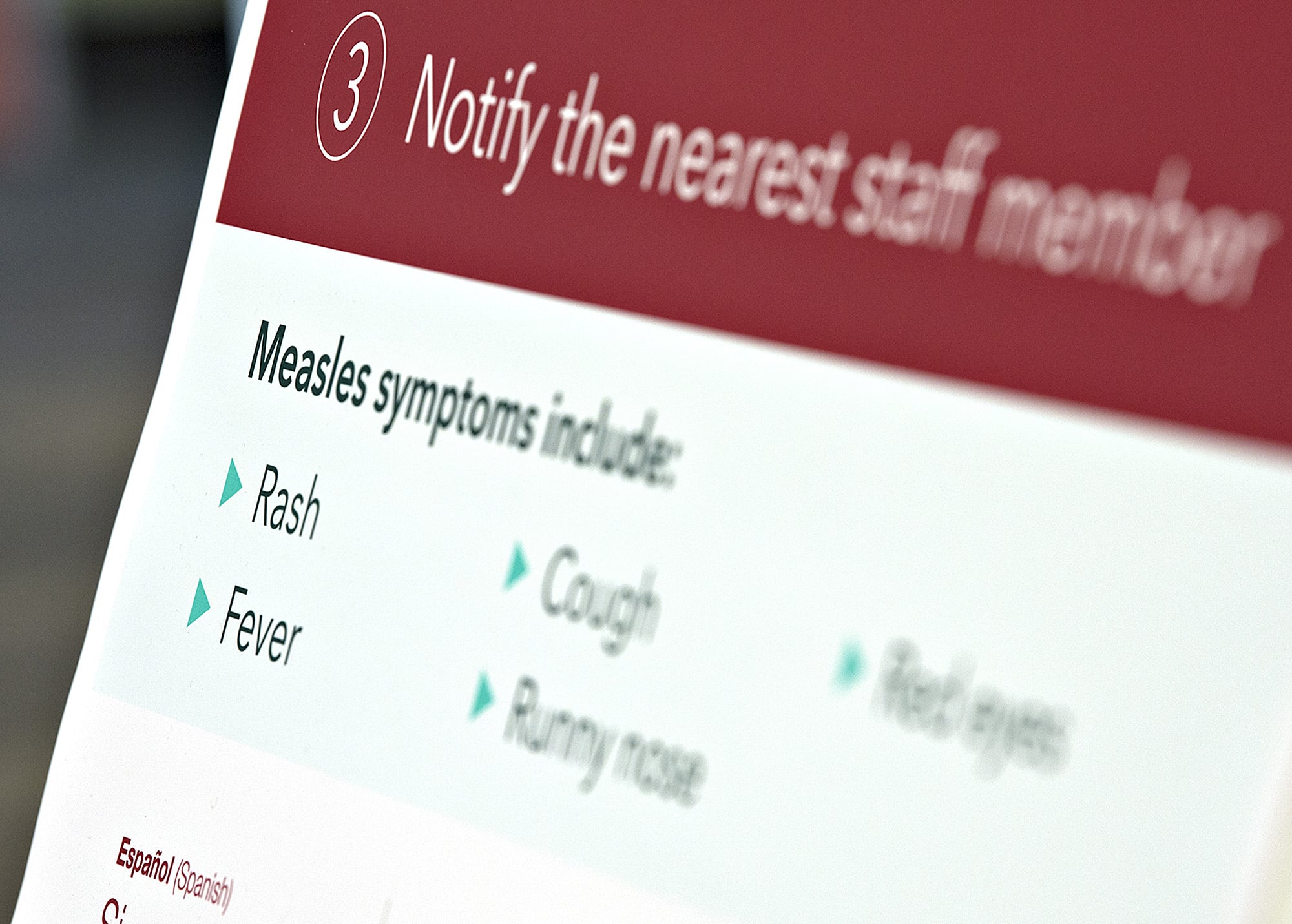The Washington Health State Department shot down speculation that Clark County’s measles outbreak has a confirmed “patient zero” on Wednesday.
As the county’s confirmed measles cases rose to 51, along with 13 suspected cases, and two new exposure dates, Julie Graham, a public information officer with the state health department, said that “patient zero” is not a term the department even uses. Some media outlets have reported “patient zero” was from another country. Graham said those reports are inaccurate.
“The concept of patient zero was a term that someone coined that doesn’t have any scientific meaning for us,” she said.
On Wednesday, there were three medical facilities named as exposure locations. Two of those facilities also added more exposure dates and times, according to Thursday’s Clark County Public Health news release:
–The Vancouver Clinic Salmon Creek, 2525 N.E. 139th St., Vancouver from 2:50 to 6 p.m. Feb. 4.
–Sea Mar Medical Clinic East Vancouver, 19005 S.E. 34th St., Vancouver from 1:50 to 5:50 p.m. Feb. 5.
Visit here for a complete list of exposure sites: www.columbian.com/news/2019/jan/29/measles-exposure-sites.
Clark County Public Health Director Dr. Alan Melnick urged people to call their medical provider before visiting their provider saying, “If you think you might have measles, don’t just go to a health care facility. Call them first so they can see you safely.”
The truth behind “patient zero”
Graham did say the State Health Department has confirmed that every Washington case of measles since the first confirmed case has matched the same wild strain of measles as the first confirmed case. That strain is currently circulating in Eastern Europe.
Clark County Public Health Department Public Information Officer Marissa Armstrong said that the first case in the Clark County outbreak was a child who had traveled to Clark County from outside the country — information that was announced in the initial outbreak news release Jan. 4.
But that doesn’t mean the child was “patient zero” of the outbreak, Armstrong said, because the fact that they were the first confirmed case by Public Health does not mean they were the source of the local outbreak.
“We may never know who ‘patient zero’ is,” Armstrong said in an email, adding “it doesn’t have any impact on how we’re responding to this outbreak.”
Melnick echoed Armstrong and added that there are probably unknown people with measles in the county who haven’t visited a health care provider. He said he wants people not to focus on patient zero but instead on ways that Clark County can improve its defense against outbreaks.
“I question the reasoning behind trying to find out who ‘patient zero’ is,” Melnick said. “Are we trying to point the finger or blame somebody?”
Exemption bill hearing
Of the 51 cases confirmed, 45 had not been immunized against the highly contagious virus. Immunization status could not be verified for six cases, and one case involved a child who had received only a single dose of the MMR vaccine. Two of those cases have moved to Georgia.
Confirmed Clark County cases include 36 children ages 1 to 10; 13 youths ages 11 to 18; and one adult between 19 and 29; one adult between 30 and 39. There is also a confirmed case in King County and four in Multnomah County, Ore.
According to the Associated Press, Oregon Gov. Kate Brown urged residents to get vaccinated Thursday. She also said Oregon will probably examine tightening its exemption laws, but her statement lacked specifics on that concept.
All 50 states require students to be vaccinated, but 18 states, including Washington, allow for personal and philosophical exemptions to vaccination. House Bill 1638, which is sponsored by Rep. Paul Harris, a Vancouver Republican, and Rep. Monica Stonier, a Vancouver Democrat, is scheduled for a public hearing in the House Committee on Health Care & Wellness Friday. That bill would eliminate personal and philosophical exemptions for the measles, mumps and rubella vaccine.
Sen. Annette Cleveland, D-Vancouver has introduced Senate Bill 5841, an even stricter vaccine bill that would eliminate the same exemptions for other immunizations in addition to MMR. Both proposals would keep the state’s medical and religious exemptions.
What to do if you might be infected
The Centers for Disease Control and Prevention reports that 90 percent of unvaccinated people exposed to the measles virus come down with the disease. The virus lives in the nose and throat mucus of an infected person, and can survive for up to two hours in an airspace where the infected person coughed or sneezed.
Health officials are urging anyone who has been exposed at an identified location and believes they have symptoms of measles to call their health care provider prior to visiting the medical office to make a plan that avoids exposing others in the waiting room.
If you are unsure of your family’s immunization status, you can view, download and print your family’s immunization information online at wa.MyIR.net or request a copy of your immunization record from the Washington State Department of Health.
Anyone with questions about measles infection or the measles vaccine should call their primary care provider or a county health department:
Clark County Public Health, 360-397-8021.
Multnomah County, Ore., Public Health, 503-988-3406.
Washington County, Ore., Public Health, 503-846-3594.
Clackamas County, Ore., Public Health, 503-655-8411.
Clark County Public Health has been regularly updating its list of locations where people may have been exposed to measles. There are dozens of locations in total, including hospitals, Portland International Airport and multiple schools.
Public Health has established a call center for questions related to the investigation. Anyone who has questions about public exposures should call 360-397-8021. The call center is open daily.
For a complete list of exposure sites, visit the Public Health measles investigation webpage at www.doh.wa.gov/YouandYourFamily/IllnessandDisease/Measles/MeaslesOutbreak.
Measles symptoms begin with a high fever, cough, runny nose and red eyes, followed by a rash that usually begins at the head and spreads to the rest of the body. A person can spread the virus before they show symptoms.
People are contagious with measles for up to four days before and up to four days after the rash appears. After someone is exposed to measles, illness develops in about one to three weeks.




